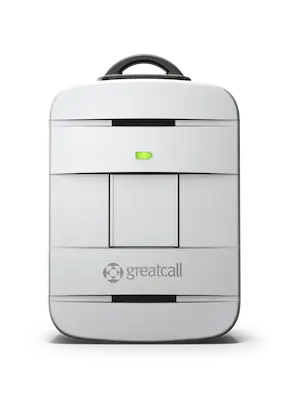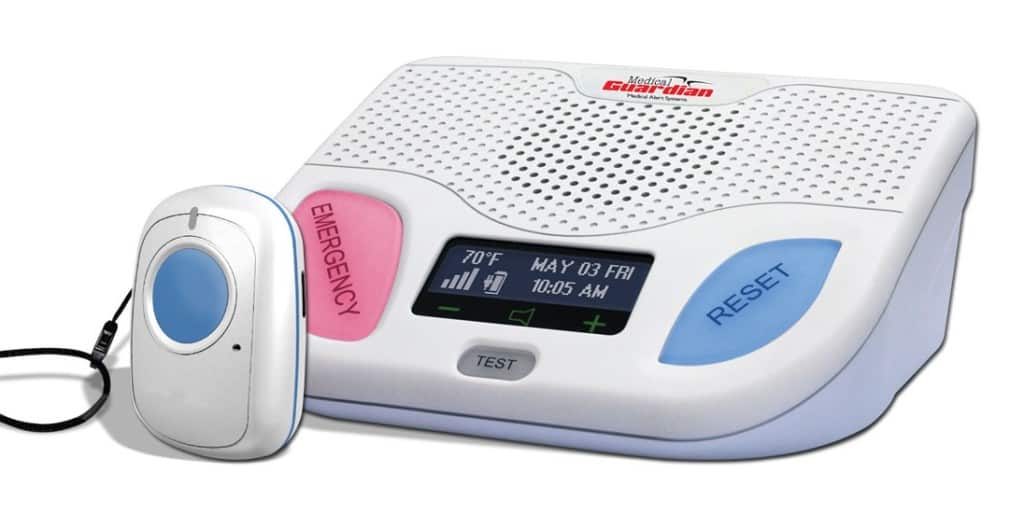Last Updated on September 4, 2020

One important feature for technology for senior medical alert or personal emergency response systems (PERS) available today is auto fall alert detection. With automatic fall detection, the system can tell if a user has fallen, and issue an alert without them needing to press the emergency button. An unfortunate fall could lead to serious injuries in elderly people. In theory, the system is helpful especially if a system users falls and does not have the presence of mind to press their pendant button. It ensures that they can get help right fast should they fall.
What Is Automatic Fall Alert Detection?
Automatic fall alert detection systems make use of sensing mechanisms built into the pendant or bracelet that users of medical alarm systems wear.
The regular elderly personal emergency alert system includes a base console connected to a telephone line. An integral part is an emergency button, also referred to as the help button. It is worn by the elderly like a bracelet or necklace. This has a wireless transmitter that can be used to activate an alert call to the monitoring center once a fall occurs. With regular systems, it relies on the senior user pressing the button once a fall occurs and they can’t get up.
Alert Call Made Automatically When Fall Is Detected
For automated fall detection systems, the sensing mechanism will complete the job by activating an alert call automatically. For other sorts of emergencies, the senior can still press the button to be connected with a monitoring station professional.
How The Technology Works
The auto-detection based on the motion changes in the body position. According to the Philips Lifeline, their Auto Alert system can detect as much as 95% of falls that might occur. In general, an auto alert fall sensor works by utilizing the accelerometers and gyroscopes to analyze unusual misalignment in the body’s position to determine if a fall has occurred. Acceleration is measured by the accelerometer, while the angular momentum is measured by the gyroscope.
Systems from companies like LifeStation and Medical Guardian offer fall detection for all their main systems: in-home, cellular (no home phone line) and premium mobile medical alert buttons. Life Alert is a pioneer in the medical alert industry, but they have not been forthcoming with adding automatic fall detection systems to their product line. If you are looking for specific examples, is a review of systems with fall detection.
What Are the Advantages of the Auto Fall Detection?
When user is unable to manually press the emergency button after a fall – Users can be assured that if they fall and lose consciousness, they can get help. For children of users, they will have that peace of mind even if your elderly parent can’t react, there is fall sensing technology to get an alarm call through.
Waterproof – The emergency button device is designed to be waterproof, so the elderly can still wear it where most falls occur – in the bathroom/shower.

Medical Guardian
Cellular & Automatic Fall Alert Emergency Alert System
What Are the Disadvantages of the System?
While the automatic fall detection alert technology is very innovative and has been used for years already, it is only recently that this technology was incorporated into medical alert systems for home use. Theoretically, it sounds like a really good feature to include. So why aren’t all the best medical alert companies jumping on this new bandwagon? In fact, we believe that a number of the major life alert companies are already looking into it.
But there are a few disadvantages that seem to be holding back acceptance of this feature:
False alarms – Technologically at this time, sensing devices are not yet that sensitive to separate a lot of normal everyday routines from actual falls. There are instances that alarms come off without an actual fall. Along with detecting actual falls, there can be many false alarm instances that users need to deal with. These false alarms are very embarrassing and a waste of time to both the user and monitoring center staff. The good thing about it is that the system is continuously undergoing refinement.
Some Falls Not Detected – Unlike a traditional home medical alert where an SOS signal is sent once the button is pressed, the fall sensing technology of automatic fall detection buttons depends on several factors to determine that a fall has taken place. Not all falls are detected. There have been times where a senior has fallen and expected an emergency call to be made, but because they moved their bodies within the first X seconds, the sensor determined that the senior did not require emergency help, and an alarm call was not necessary.
Auto fall alert sensors typically require the senior who has fallen to hold still for 10 to 20 seconds after a fall to determine that an automated fall alarm call is justified. This not only delays the emergency alert calling, but it can also lead to unfulfilled expectations.
Sliding falls less detectable – There were cases of unreliability of the system, in addition to the notable false alarms, the auto detect device could have difficulty “sliding” falls, such as when the wearer slides down to the floor from their chair/wheelchair. In July 2014, a user on wheelchair fell and the alarm did not go off. Unfortunately, she passed away several hours later.
Higher cost – The automatic fall alarm system is more expensive compared to the regular manual counterparts. The Philips Lifeline Auto Alert system cost $45 and up a month to run. Users can find quality personal emergency response systems for quite a bit less.
False sense of security – Having an auto fall alert feature may allow users and their family members to feel more confident that users can get help when they need it. However, no system can detect 100% of falls. Having a system like this provides a false sense of security and cause additional confusion about how medical alert systems should work.
In Conclusion
Adoption of automatic fall detection technology for personal emergency response systems has been growing in the past few years. It offers extra peace of mind to many users, especially seniors with illnesses that make them susceptible to falling or becoming incapacitated. They may not be able to manually pressing their help button when they most need to.
On the flip side, if you do choose to get this for yourself or your parents, there is a chance that it may not meet your level of expectations. Senior users may have to deal with unpleasant false alarms coming up. Also, not all falls are detected. The user should be aware that in some cases, they will still need to manually press the help button in order to activate an alarm call.
If you like to try it out, we suggest looking into LifeStation, Medical Guardian or the Philips Lifeline Auto Alert system. Another choice is the Lively Mobile medical alert pendant that can work both in and out of the home.
- Bay Alarm Medical In-Home Cellular Response Speed 46% Faster in 2023 - July 5, 2023
- Medical Alert Systems For Landlines - November 20, 2022
- The Truth About Long-Range Medical Alert Systems - May 1, 2022
In a hurry? Leave us your email, we’ll follow-up with the best tips.


PACEMAKER USERS BEWARE! We learned the expensive way that there is another major disadvantage to medical alert systems, in particular those that require the use of a pendent do detect falls. The problems is that radio devices should not be held close to a pacemaker implant, and yet the fall-detection pendent must hang very close to the sternum. We paid a lot of money for a GreatCall device and the extra-cost service for fall-detection. It is worthless to us because of this limitation. When we called GreatCall support, they said they are aware of this limitation and that there is no solution. GreatCall does not state this known limitation in any of its sales information and it is never mentioned by their sales representatives. Despite know the limitation and not telling prospective buyers about it, GreatCall will not refund setup and enrollment costs or pay for return shipping. I have been shopping for alternative fall-detection medical alert devices, and have not found a single provider that mentions concerns or limitations of using their device with pacemakers. The medical alert industry seems far more concerned with selling devices and services to anybody and everybody, rather than ensuring potential customers purchase something they can use.
Do have to have a land line phone for these systems to work
Auto Alert pendant systems work both with or without landlines, depending on the company and what they offer. Here is one example of an auto fall alert that does not require a landline to work. Different companies have different configurations, so please check with the company that you are interested in to make sure that their system fulfills your needs.